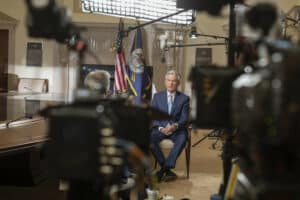
Federal Reserve Chair Jerome Powell films an interview with CBS' 60 Minutes news program in this April handout photo. Federal Reserve photo
President Joe Biden announced Monday that he’s nominating Jerome Powell for a second four-year term as Federal Reserve chair, endorsing Powell’s stewardship of the economy through a brutal pandemic recession in which the Fed’s ultra-low rate policies helped bolster confidence and revitalize the job market.
Biden also said he would nominate Lael Brainard, the lone Democrat on the Fed’s Board of Governors and the preferred alternative to Powell among many progressives, as vice chair. The president said he will fill the three remaining slots on the board, including a vice chair for supervision, a bank regulatory post, in early December.
Biden’s decision, reached after extensive consideration, strikes a note of continuity and bipartisanship at a time when surging inflation is burdening households and raising risks to the economy’s recovery. In backing Powell, a Republican who was first elevated to his post by President Donald Trump, Biden brushed aside complaints from progressives that the Fed has weakened bank regulation and has been slow to take account of climate change in its supervision of banks.
If confirmed by the Senate, Powell would remain one of the most powerful economic officials in the world. By either raising or lowering its benchmark interest rate, the Fed seeks to either cool or stimulate growth and hiring, and to keep prices stable. Its efforts to direct the U.S. economy, the largest in the world, typically have global consequences.
The Fed’s short-term rate, which has been pegged near zero since the pandemic hammered the economy in March 2020, influences a wide range of consumer and business borrowing costs, including for mortgages and credit cards. The Fed also oversees the nation’s largest banks.
In a second term, to begin in February, Powell would face a difficult and high-risk balancing act: Rising inflation is causing hardships for millions of families, clouding the economic recovery and undercutting the Fed’s mandate to keep prices stable. But with the economy still 4 million-plus jobs shy of its pre-pandemic level, the Fed has yet to meet its other mandate of maximizing employment.
If the Fed moves too slowly to raise rates, inflation may accelerate further and force the Fed to take more draconian steps later to rein it in, potentially causing a recession. Yet if the Fed hikes rates too quickly, it could choke off hiring and the economic recovery.
Powell’s re-nomination must be approved in a vote by the Senate Banking Committee and then confirmed by the full Senate, which is considered likely.
Climate Drove Opposition to Powell
Sens. Sheldon Whitehouse from Rhode Island and Jeff Merkley from Oregon announced their opposition to Powell’s nomination on Friday saying the next Fed chair needed to help tackle climate change. They were f following in the footsteps of Massachusetts’ Sen. Elizabeth Warren, the only other senator to announce their opposition to Powell. Warren called Powell “a dangerous man” to lead the Fed because of his support for loosening some bank regulations.
Powell has broad support among Senate Republicans, however, and if nominated would likely receive bipartisan backing. He was approved as Fed chair in early 2018 by an 84-13 vote, with 39 Democrats voting in favor, including Whitehouse. Merkley voted no, as did Vice President Kamala Harris, then a senator from California.
Progressives have largely cited climate concerns as they have pushed to replace Powell, and have looked to Brainard as a potential replacement who could lead the Fed into this fight. However, the central bank has already come under criticism from Republicans in Congress for the limited steps that Powell has taken on the issue. He has set up two committees to analyze the impact of rising temperatures on the financial system and last December the Fed joined an international group of central banks and financial regulators that are monitoring the impact of climate change on banks.
Environmentalists warn that extreme weather, worsened by global warming, will increasingly create major losses for banks and insurance companies. Bank loans to commercial and residential properties near the coasts are at risk from rising ocean levels and other climate impacts, potentially threatening banks’ financial health, the groups say.
And lending to oil and gas companies carries additional risk as the world transitions to clean energy, environmentalists add. That suggests that banks should be more cautious before making loans to drilling and other companies in the energy sector.
Such concerns have raised objections from conservatives, however, that the Fed could respond by taking steps to discourage bank loans to such companies.
Powell Opposes Climate Curbs on Banks
Powell said at a press conference earlier this month that “we do think we have a role in climate change.”
But when it came to issues such as regulating what industries banks could lend to, Powell said, “that’s not a decision for bank regulators or for any agency. That’s a decision for elected representatives.”
In a speech last month, Brainard said the Fed will likely provide guidance to the banks that it supervises on how they can better assess the risks that climate change poses to their loan portfolios, though she did not provide a timeline.
“Climate change,” she said, “is projected to have profound effects on the economy and the financial system, and it is already inflicting damage.”
Material from prior Associated Press reports was included in this story.




 |
| 
